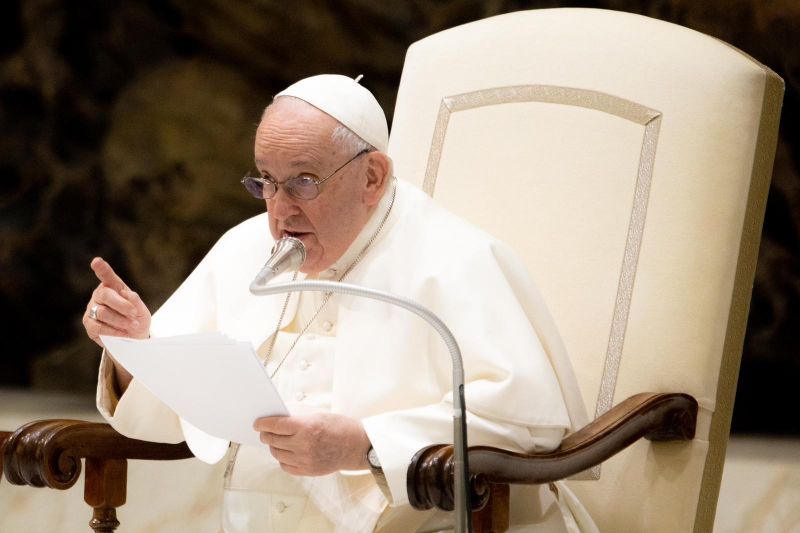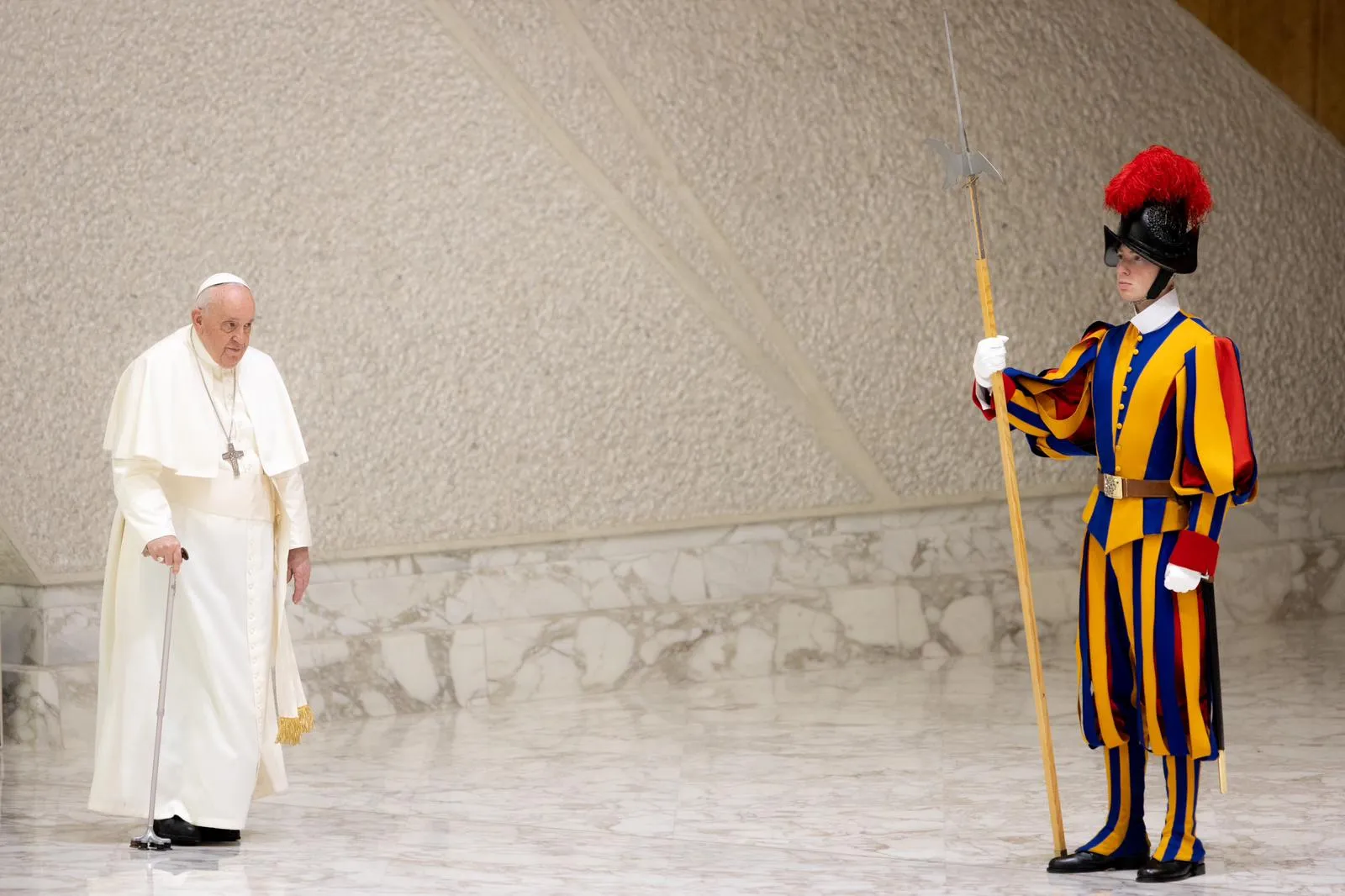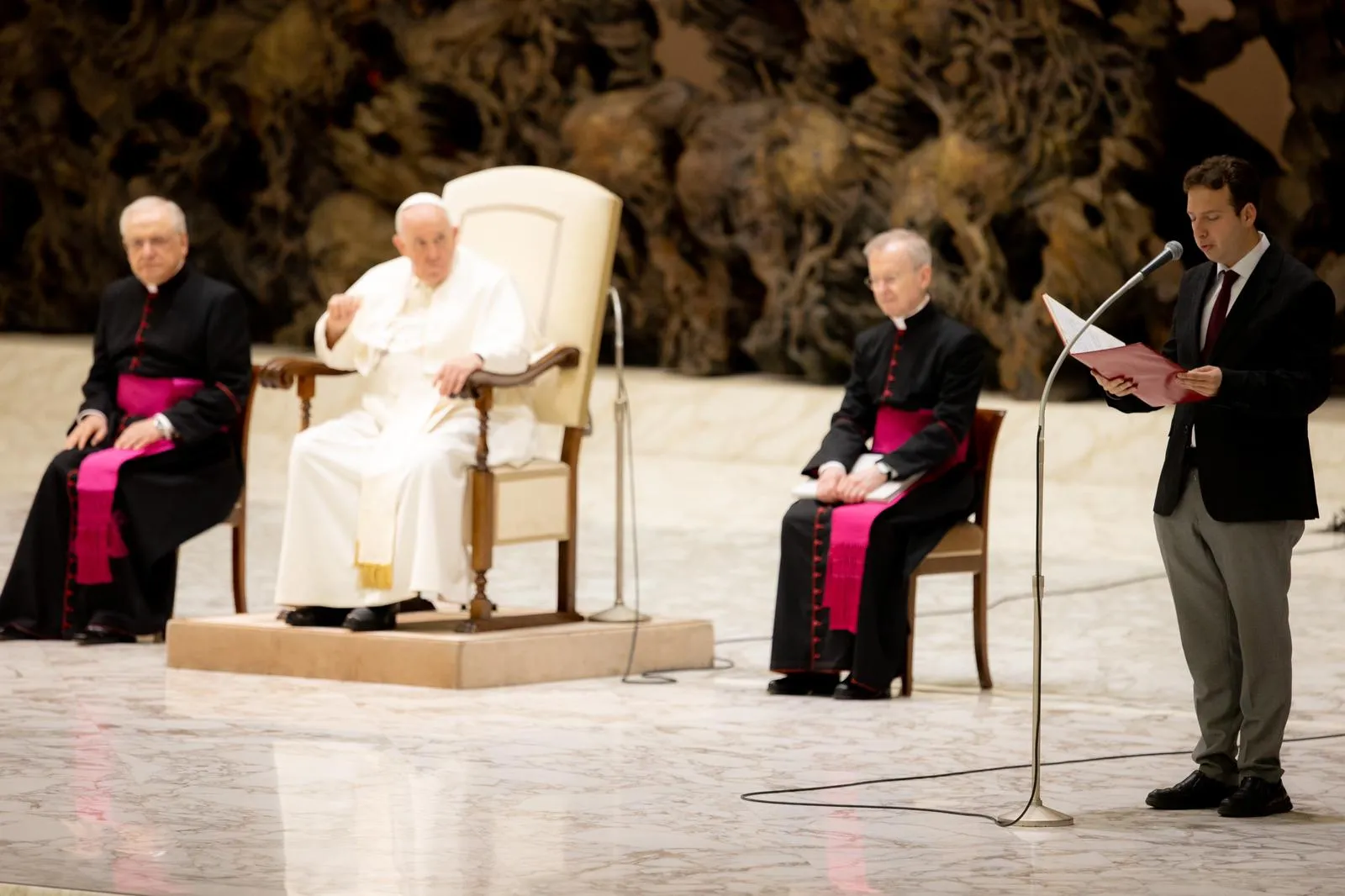
Vatican City, Feb 22, 2023 / 03:00 am (CNA).
Pope Francis said Wednesday that the traditions of the Church should not be based on opinion or ideological leanings, but on whether they favor the proclamation of the Gospel.
“Everything in the Church must be conformed to the requirements of the proclamation of the Gospel; not to the opinions of the conservatives or the progressives, but to the fact that Jesus reaches people’s lives,” he said Feb. 22.
Francis asked: When there are ideological divisions in the Church, such as an identification as conservative or progressive, “where is the Holy Spirit?”
“Be careful,” he warned. “The Gospel is not an idea; the Gospel is not an ideology. The Gospel is a proclamation that touches the heart and makes the heart change. You are making the Gospel a political party, an ideology, a club…”

The pope’s weekly general audience took place in a full Paul VI Hall on Ash Wednesday, the first day of the penitential Lenten season.
Speaking to pilgrims from around the world, he said, “Every choice, every use, every structure, and tradition [of the Church] is be evaluated on the basis of whether they favor the proclamation of Christ.”
“In this way the Spirit sheds light on the path of the Church, always. In fact, he is not only the light of hearts; he is the light that orients the Church: he brings clarity, helps to distinguish, helps to discern,” he said. “This is why it is necessary to invoke him often; let us also do so today, at the beginning of Lent.”
To illustrate his point, Pope Francis recalled “a pivotal moment” from the early Church, recounted in the Acts of the Apostles.
The apostles were worried about what to do with pagans who became Christian, but were not part of the Jewish people: “Were they or were they not bound to observe the prescriptions of the Mosaic Law?”

To resolve this problem, the apostles gathered in what was called the Council of Jerusalem, the first Church council in history, he explained.
The apostles “might have sought a good compromise between tradition and innovation: some rules are observed, others are left out,” he said, but what they did instead was “adapt to the work of the Spirit.”
“And so,” he continued, “removing almost every obligation related to the Law, they communicate the final decisions, made — and they write this — by ‘the Holy Spirit and by us’ (cf. Acts 15:28).”
“This is how the apostles always act,” he underlined. “Together, without being divided, despite having different sensitivities and opinions, they listen to the Spirit.”
Pope Francis asked everyone to think about whether they pray often to the Holy Spirit, or if they only speak to Jesus and the Father, or invoke the Virgin Mary and the saints, in their prayers.
“Because, as Church, we can have well-defined times and spaces, well-organized communities, institutes and movements, but without the Spirit, everything remains soulless,” he said. “The organization … is not enough. It is the Spirit who gives life to the Church.”
“The Church, if it does not pray to him and invoke him, closes in on itself, in sterile and exhausting debates, in wearisome polarizations, while the flame of the mission is extinguished,” he added.
The pope called it sad to see the Church operate as if it is just a parliament, when it is really a community of men and women who believe in and proclaim Jesus Christ, guided by the Holy Spirit, not their own reason.
“The Spirit makes us go out, urges us to proclaim the faith in order to confirm ourselves in the faith, to go on mission to discover who we are,” he said. “That is why the Apostle Paul recommends: ‘Do not quench the Spirit’ (1 Thessalonians 5:19).”
“Let us pray to the Spirit often, let us invoke him, let us ask him every day to kindle his light in us,” he urged. “Let us do this before each encounter, to become apostles of Jesus with the people we find.”
If you value the news and views Catholic World Report provides, please consider donating to support our efforts. Your contribution will help us continue to make CWR available to all readers worldwide for free, without a subscription. Thank you for your generosity!
Click here for more information on donating to CWR. Click here to sign up for our newsletter.




To me this exaggerates the circumcision question. They were doing this in my former parish in the late 1990’s so it’s not new; what seems to be happening is there is a purpose to make it theologically definitive.
I raised objections back then and it is not as if I wasn’t heard.
An interesting detail is that today’s exaggeration now involves a Pope just as the original stumbling block – circumcision – held up Peter the first Pope.
The Council of Jerusalem laid out 4 prohibitions and from the account in Acts the matter of circumcision was ultimately sidelined as not bearing on forward with any continuing importance.
The 4 prohibitions apply to everyone not merely to the unconverted. Peter put the stress on grace and hence the Council was a witness to the integrity and efficacy of baptism. The sense is very much that the conclusions reached are permanently enduring and unchangeable.
By this time Peter would have felt the further edification in his own baptism of Cornelius; however, to get to it he had to endure the imposition from Paul and yield to Paul.
In the CNA account above, the idea is given that at the time of the first Apostles, some “tradition” extends from the past. Is that really so? Surely it is our faith that what they were initiating in the Council of Jerusalem is Tradition as it comes forth from the Redemption.
Another insight from my former parish is that there could be a lot of mentalist engagement on all sorts of headings but “going forth” kind of stayed the same, which was generally immobile and well positioned in the comfort zone. What the mentalism achieved was raising mental connectivity and helping the group always behave in concert, quite artificial.
Theory and practice …… diverge? – converge? – both?
“You are making the Gospel a political party, an ideology, a club…”
Francis gave an ambulance to Ukraine, but he continually gives no truck to faithful Catholics.
Where’s the Holy Spirit in that?
“The Spirit makes us go out,…. to go on mission to discover who we are,” Francis said.
No, the spirit makes us go INto God. We go on mission [out to the periphery] to share with others the God in whom we are and in whom others may be.
Will someone mail him a catechism?
“And so,” he continued, “removing almost every obligation related to the Law, they communicate the final decisions, made — and they write this — by ‘the Holy Spirit and by us’ (cf. Acts 15:28).”
“This is how the apostles always act,” he underlined. “Together, without being divided, despite having different sensitivities and opinions, they listen to the Spirit.”
Listening to the Spirit of God leads one to follow His Law. His Law includes the Ten Commandments. Love of God is where the Spirit of God dwells. One does not love God if one does not follow all the words of command which God the Father, God the Son, and God the Holy Spirit speak.
Where the ‘spirit’ speaks differently from the eternal words of the Father and the Son, that ‘spirit’ is UNholy and is not from God. Logic and Reason vs. Francis.
Our God gave us Himself in the Incarnation and in His Spirit. Where the Spirit is, the Son is also. When the Son of God incarnates (appears in the flesh) to confirm Francis’ understanding of the ‘spirit,’ I’ll believe Francis.
Tongues, anyone? When the Holy Spirit anointed and empowered the Church at Pentecost, He proved His Presence with works and words and signs. Francis travels alone with none of the signs (fruits and gifts) of the Holy Spirit. Ergo.
Could he be urged to step aside?
We read: “In fact, he [the Spirit] is not only the light of hearts; he is the light that orients the Church: he brings clarity…”
Clarity. Indeed.
“Everything in the Church must be conformed to the requirements of the proclamation of the Gospel; not to the opinions of the conservatives or the progressives, but to the fact that Jesus reaches people’s lives,” (Pope Francis Feb 22).
Yes. However, Jesus said to Peter and the other Apostles, ‘Teach them all that I have commanded you. Repentance for the forgiveness of sins’. Christ Our Lord never said, ‘Forgive whether or not they repent of their sins’, as you did to Spanish seminarians regarding confession of sins, the sacrament of penance. Christ Jesus never said adultery wasn’t adultery as you did because of mitigating circumstances in Amoris Laetitia. You omitted grace in that section! The whole purpose of the crucifixion and resurrection, of the descent of the Holy Spirit upon the faithful. Our Lord never said about homosexuality, ‘God made you as you are, he loves you.
Today is the feast day of the Chair of Peter, on which you sit, instituted by Christ to defend the truth in the Apostolic witness of the Church. All the Apostles condemned homosexual acts, although you appoint homosexual advocates to key positions in the governance of the Church, continue to promote men to high office who believe Church teaching on homosexual behavior, in effect the scriptures themselves need to be revised.
As such it is you who excludes us, those who cannot surrender and repudiate the faith handed down to us from the Apostles. You call us dangerous, ‘backwardists’, persons closed to compassion. You expect us to leave the Catholic Church and join the equivalent of an enlightened men’s social club. That we resist. We remain true to the Chair of Peter, its long history of loyalty to Christ evident in its ample formal doctrinal documentation, not to the opinions of its occupant.
Truth and courage to say and do what is right. We bless those who lead by godly example. Thanks be to God for Christ inspired leadership.
Gospel – Good News of healing and empowerment.